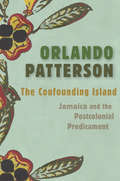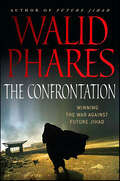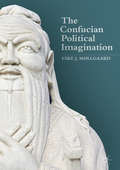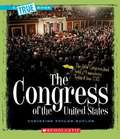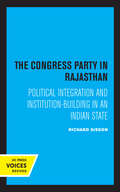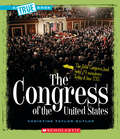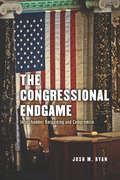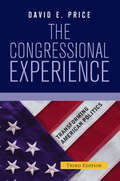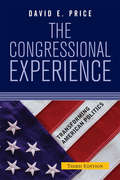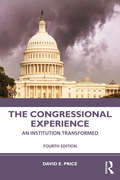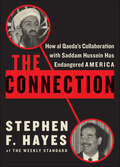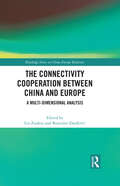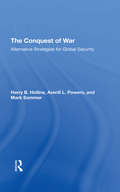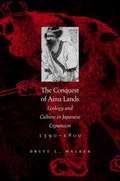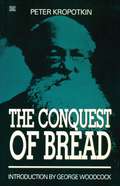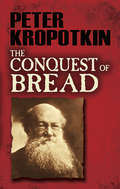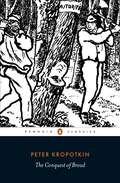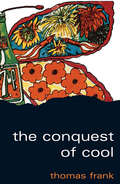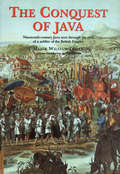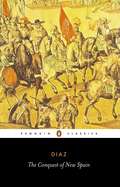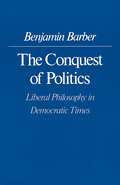- Table View
- List View
The Confounding Island: Jamaica and the Postcolonial Predicament
by Orlando PattersonOrlando Patterson returns to Jamaica, his birthplace, to reckon with its history and culture. Locals claim to be some of the world’s happiest people, and their successes in music and athletics are legendary. Yet the country remains violent and poor. In Jamaica the dilemmas of globalization and postcolonial politics are thrown into stark relief.
The Confrontation: Winning the War against Future Jihad
by Walid PharesIn Future Jihad, terrorism and Middle East expert Walid Phares gave a definitive account of the historical and cultural forces that led to September 11 and the rise of radical Islam. In The War of Ideas, he revealed the conflict of ideologies that underlie the War on Terror. Now, in The Confrontation, he identifies the clashes to come and provides a blueprint for defeating the forces of jihad. Moving from the ravaged villages of the Sudan to London's Muslim neighborhoods to the battlefields of Iraq and Afghanistan, he illuminates the vast and complex world of the global jihadist movement. He offers a multi-pronged strategy, global in scope, and calls on the world's diverse local and international institutions to come together and coordinate their efforts. Pointing the way forward, this book shows how we might reclaim a world that is safe for freedom and democratic societies.
The Confucian Political Imagination
by Eske J. MøllgaardThis book critically examines the Confucian political imagination and its influence on the contemporary Chinese dream of a powerful China. It views Confucianism as the ideological supplement to a powerful state that is challenging Western hegemony, and not as a political philosophy that need not concern us. Eske Møllgaard shows that Confucians, despite their traditionalist ways, have the will to transform the existing socio-ethical order. The volume discusses the central features of the Confucian political imaginary, the nature of Confucian discourse, Confucian revivals, Confucian humanism and civility, and the political ideal of the Great Unity. It concludes by considering if Confucianism can be universalized as an ideology in competition with liberal democracy.
The Congress Of The United States
by Christine Taylor-ButlerIdeal for today's young investigative reader, each A True Book includes lively sidebars, a glossary and index, plus a comprehensive "To Find Out More" section listing books, organizations, and Internet sites. A staple of library collections since the 1950s, the new A True Book series is the definitive nonfiction series for elementary school readers. A True Book -- American History: How do you wrap a 450,000-pound gift? What is the world's oldest and shortest written consitution? Find out in this patriotic celebration of things uniquely American.
The Congress Party in Rajasthan: Political Integration and Institution-Building in an Indian State (Center for South and Southeast Asia Studies, UC Berkeley)
by Richard SissonThis title is part of UC Press's Voices Revived program, which commemorates University of California Press’s mission to seek out and cultivate the brightest minds and give them voice, reach, and impact. Drawing on a backlist dating to 1893, Voices Revived makes high-quality, peer-reviewed scholarship accessible once again using print-on-demand technology. This title was originally published in 1972.
The Congress of the United States (A True Book (Relaunch))
by Christine Taylor-ButlerLearn the details of the Legislative Branch of governement.A True Book: American History series allows readers to experience the earliest moments in American history and to discover how these moments helped shape the country that it is today. This series includes an age appropriate (grades 3-5) introduction to curriculum-relevant subjects and a robust resource section that encourages independent study.This book describes the legislative branch of the United States government, and discusses each of its two parts, how it works, its origins, and notable events in its history, including impeachments and declarations of war.
The Congress: Into the Third Century
by Richard Bernstein Jerome AgelBrief description of the development of Congress over the first two centuries of our Constitution.
The Congressional Endgame: Interchamber Bargaining and Compromise
by Josh M. RyanCongress is a bicameral legislature in which both the House and Senate must pass a bill before it can be enacted into law. The US bicameral system also differs from most democracies in that the two chambers have relatively equal power to legislate and must find ways to resolve their disputes. In the current landscape of party polarization, this contentious process has become far more chaotic, leading to the public perception that the House and Senate are unwilling or unable to compromise and calling into question the effectiveness of the bicameral system itself. With The Congressional Endgame, Josh M. Ryan offers a coherent explanation of how the bicameral legislative process works in Congress and shows that the types of policy outcomes it produces are in line with those intended by the framers of the Constitution. Although each bargaining outcome may seem idiosyncratic, the product of strong leadership and personality politics, interchamber bargaining outcomes in Congress are actually structured by observable institutional factors. Ryan finds that the characteristics of the winning coalition are critically important to which chamber “wins” after bargaining, with both conference committees and an alternative resolution venue, amendment trading, creating policy that approximates the preferences of the more moderate chamber. Although slow and incremental, interchamber negotiations serve their intended purpose well, The Congressional Endgame shows; they increase the odds of compromise while at the same time offering a powerful constraint on dramatic policy changes.
The Congressional Experience
by David E. PriceCongressman David Price proves he is uniquely qualified to guide us through the labyrinth of rules, roles, and representatives that is Congress. This third edition is thoroughly updated to cover developments over the past several years - the Bush presidency, consolidated Republican control of the White House and Congress, the plunge from budget surpluses to record deficits, and the "Bush revolution" in foreign policy. A new chapter has also been on defense and foreign affairs, emphasizing the author's own work on Middle East policy and Congress' handling of the war in Iraq. The reader gets a clear sense of the challenges, disappointments, elation, and deep concerns implicit in serving as a member of Congress-especially the kind of member David Price has chosen to be.
The Congressional Experience
by David E. PriceCongressman David Price proves he is uniquely qualified to guide us through the labyrinth of rules, roles, and representatives that is Congress. This third edition is thoroughly updated to cover developments over the past several years - the Bush presidency, consolidated Republican control of the White House and Congress, the plunge from budget surpluses to record deficits, and the "Bush revolution" in foreign policy. A new chapter has also been on defense and foreign affairs, emphasizing the author's own work on Middle East policy and Congress' handling of the war in Iraq. The reader gets a clear sense of the challenges, disappointments, elation, and deep concerns implicit in serving as a member of Congress-especially the kind of member David Price has chosen to be.
The Congressional Experience
by David E. PriceCongressman David Price proves he is uniquely qualified to guide us through the labyrinth of rules, roles, and representatives that is Congress. This third edition is thoroughly updated to cover developments over the past several years - the Bush presidency, consolidated Republican control of the White House and Congress, the plunge from budget surpluses to record deficits, and the "Bush revolution" in foreign policy. A new chapter has also been on defense and foreign affairs, emphasizing the author's own work on Middle East policy and Congress' handling of the war in Iraq. The reader gets a clear sense of the challenges, disappointments, elation, and deep concerns implicit in serving as a member of Congress-especially the kind of member David Price has chosen to be.
The Congressional Experience: An Institution Transformed
by David E PriceCongressman David Price is uniquely qualified to guide readers through the labyrinth of rules, roles, and representatives that is Congress. As a trained political scientist, he connects the practical politics on the Hill with the theories of the discipline. He is equally focused on the ethics of public service at a time when politics seem to have reached a new low. Through it all, he conveys a clear sense of the challenges, disappointments, elations, and deep concerns implicit in serving as a member of Congress--especially at a time of national and international fragility. New to the 4th Edition • Covers elections and presidencies since the third edition including serving with Obama and Trump. • Details the Trump impeachment process and the subsequent pandemic bringing change to Congressional floor voting processes, putting current crises in context with prior occasions during the Clinton and George W. Bush presidencies. • Looks at the reform agenda and the prospects for national political renewal.
The Connection: How al Qaeda's Collaboration with Saddam Hussein Has Endangered America
by Stephen F. HayesIn the wake of 9/11 no one knew when the next attack would come, or where it would come from. America's enemies seemed gathered on all sides, and for several nerve-racking months, we lived in fear that the perpetrators might be plotting another action or, worse, that our most dangerous enemies -- al Qaeda and Saddam Hussein's murderous regime in Iraq -- could be banding together against us.The Bush administration and CIA director George Tenet warned against complacency and pointed to growing indications that al Qaeda and Iraq were in league. But their case was undercut by unnamed intelligence officials, skeptical politicians, and a compliant media. So America relaxed. A comforting consensus settled in: Osama bin Laden was an impassioned fundamentalist, Saddam a secular autocrat. The two would never, could never, work together. ABC News reported that there was no connection between them, and the New York Times said so too, and pretty soon just about everyone agreed.Just about everyone was wrong.In The Connection, Stephen Hayes draws on CIA debriefings, top-secret memos from our national intelligence agencies, and interviews with Iraqi military leaders and Washington insiders to demonstrate that Saddam and bin Laden not only could work together, they did -- a curious relationship that stretches back more than a decade and may include collaboration on terrorist acts, chemical-weapons training, and sheltering some of the world's most wanted radicals.Stephen Hayes's bombshell Weekly Standard piece on this topic was cited by Vice President Cheney as the "best source of information" about the Saddam-al Qaeda connections. Now Hayes delves even deeper, exposing the inner workings of America's deadliest opponents and providing a clear-eyed corrective to reams of underreported, politicized, and just plain wrong information.The Connection is both a gripping snapshot of the War on Terror and a case study in how bureaucratic assumptions and media arrogance can put us all at risk.
The Connectivity Cooperation Between China and Europe: A Multi-Dimensional Analysis (Routledge Series on China-Europe Relations)
by Liu ZuokuiThis book is the first systematic China-based study on connectivity cooperation between China and Europe. It is packed with discussion of scholars not just from China, but also Central and Eastern Europe on the origin and paradigm of China-European connectivity from a range of different perspectives. As a result of intensive coordination efforts, the study co-edited by the Chinese Academy of Social Sciences and the Institute of International Politics and Economics in Serbia, aims at providing policy suggestions for fostering greater links between China and European countries heading into the future. Furthermore, this Cooperation is used as a special research case to showcase and promote cooperation between China and Europe along with its achievements and challenges. This collection of essays is the fruit of extensive transnational efforts and will be a valuable resource for all those working in the areas of International Relations and Political Science with a focus on China and Europe.
The Conquest Of War: Alternative Strategies For Global Security
by Harry B Hollins Averill L. Powers Mark Sommer Roger D FisherThis book explores alternative systems and strategies for global security by which the conflicts between nations can be carried on, and ultimately resolved, without recourse to war, examining system changes some of which may take many years to enact.
The Conquest of Ainu Lands: Ecology and Culture in Japanese Expansion, 1590-1800
by Brett L. WalkerThis model monograph is the first scholarly study to put the Ainu--the native people living in Ezo, the northernmost island of the Japanese archipelago--at the center of an exploration of Japanese expansion during the seventeenth and eighteenth centuries, the height of the Tokugawa shogunal era. Inspired by "new Western" historians of the United States, Walker positions Ezo not as Japan's northern "frontier" but as a borderland or middle ground. By framing his study between the cultural and ecological worlds of the Ainu before and after two centuries of sustained contact with the Japanese, the author demonstrates with great clarity just how far the Ainu were incorporated into the Japanese political economy and just how much their ceremonial and material life--not to mention disease ecology, medical culture, and their physical environment--had been infiltrated by Japanese cultural artifacts, practices, and epidemiology by the early nineteenth century. Walker takes a fresh and original approach. Rather than presenting a mere juxtaposition of oppression and resistance, he offers a subtle analysis of how material and ecological changes induced by trade with Japan set in motion a reorientation of the whole northern culture and landscape. Using new and little-known material from archives as well as Ainu oral traditions and archaeology, Walker poses an exciting new set of questions and issues that have yet to be approached in so innovative and thorough a fashion.
The Conquest of Bread
by Peter KropotkinThe clearest statement of Kropotkin's anarchist social doctrines. In Kropotkin's own description, the book is "a study of the needs of humanity, and of the economic means to satisfy them."
The Conquest of Bread
by Peter KropotkinBorn a Russian prince, Peter Kropotkin (1842–1921) rejected his title and wealth to spend his life in pursuit of social justice and equality. His last major work, The Conquest of Bread, surveys economic methods for the satisfaction of human needs. The 1892 treatise also outlines the revolutionary path to his vision of utopia: an anarchist communist society.Kropotkin criticizes the effects of feudalism and capitalism, noting that both systems exacerbate poverty and promote privilege, even in times of abundance. Citing the human propensity toward voluntary cooperation, he proposes the establishment of free, self-sufficient anarchic communesand outlines practical considerations of production and distribution. The author supports his theories with examples from the French rebellions of 1789, 1848, and 1871, and his reasoning anticipates aspects of twentieth-century revolutions in Russia, Germany, and Spain. At a time when many thinkers employed the new Darwinian concept of "survival of the fittest" to justify their capitalist and imperialist goals, Kropotkin pointed out the historic patterns of humanity's best success under cooperative circumstances. A century later, his economic analysis remains fresh and relevant.
The Conquest of Bread
by Peter Kropotkin'Well-being for all is not a dream.'In this brilliantly enjoyable, challenging rallying-cry of a book, Kropotkin lays out the heart of his anarchist beliefs - beliefs which surged around the world in the late 19th and early 20th centuries and which have a renewed relevance and poignancy today. Humane, thoughtful - but also a devastating critique of how modern society is organized (with the brutal, narrow few clinging onto their wealth and privileges at the expense of the many), The Conquest of Bread is a book to be argued over, again and again.
The Conquest of Cool: Business Culture, Counterculture, and the Rise of Hip Consumerism
by Thomas FrankWhile the youth counterculture remains the most evocative and best-remembered symbol of the cultural ferment of the 1960s, the revolution that shook American business during those boom years has gone largely unremarked. In this revealing book, Thomas Frank shows how the youthful revolutionaries were joined--and even anticipated --by such unlikely allies as the advertising industry and the men's clothing business.
The Conquest of Java
by William ThornOriginally published in 1815, Major William Thorn's The Conquest of Java describes the military and naval elements of the British expeditionary force to Java in 1811.It was a time of unrest in Europe. Napoleon was at the height of his power and had taken control of Holland and its colonies in Asia. In August 1810, Britain's Lord Minto, Governor General of India, was ordered by the English East India Company to expel "the enemy" from the Island of Java.On August 4, 1811 a fleet of 100 British ships, carrying 12,000 soldiers, landing in the Bay of Batavia. Among the landing party was the ambitious young company employee from Penang who originally masterminded the plan to take Java, and become Lieutenant-Governor of the island at the tender age of 30. This was none other than Thomas Stamford Raffles who, eight years later, would found Singapore.The Conquest of Java provides a unique and scrupulously detailed account of the British military campaign to wrest control of the island. Written by an officer who took part, Major William Thorn, and lavishly illustrated with 35 color plates, this historically important book provides a wealth of statistical and anecdotal information about Java and its environs.
The Conquest of New Spain
by Bernal Diaz del CastilloVivid, powerful and absorbing, this is a first-person account of one of the most startling military episodes in history: the overthrow of Montezuma's doomed Aztec Empire by the ruthless Hernan Cortes and his band of adventurers. Bernal Díaz del Castillo, himself a soldier under Cortes, presents a fascinatingly detailed description of the Spanish landing in Mexico in 1520 and their amazement at the city, the exploitation of the natives for gold and other treasures, the expulsion and flight of the Spaniards, their regrouping and eventual capture of the Aztec capital.
The Conquest of Politics: Liberal Philosophy in Democratic Times
by Benjamin R. BarberThe description for this book, The Conquest of Politics: Liberal Philosophy in Democratic Times, will be forthcoming.
The Conquest of Texas: Ethnic Cleansing in the Promised Land, 1820-1875
by Gary Clayton AndersonThe Conquest of Texas is the story of the struggle between Anglos and Indians for land. Anderson tells how Scotch-Irish settlers clashed with farming tribes and then challenged the Comanches and Kiowas for their hunting grounds. Next, the decade-long conflict with Mexico merged with war against Indians. For fifty years Texas remained in a virtual state of war. By confronting head-on the romanticized version of Texas history that made heroes out of Houston, Lamar, and Baylor, Anderson helps us understand that the history of the Lone Star state is darker and more complex than the mythmakers allowed.
The Conquest of the Russian Arctic
by Paul R. JosephsonSpanning nine time zones from Norway to the Bering Strait, the immense Russian Arctic was mostly unexplored before the twentieth century. This changed rapidly in the 1920s, when the Soviet Union implemented plans for its conquest. The Conquest of the Russian Arctic, a definitive political and environmental history of one of the world's remotest regions, details the ambitious attempts, from Soviet times to the present, to control and reshape the Arctic, and the terrible costs paid along the way. Paul Josephson describes the effort under Stalin to assimilate the Arctic into the Soviet empire. Extraction of natural resources, construction of settlements, indoctrination of nomadic populations, collectivization of reindeer herding--all was to be accomplished so that the Arctic operated according to socialist principles. The project was in many ways an extension of the Bolshevik revolution, as planners and engineers assumed that policies and plans that worked elsewhere in the empire would apply here. But as they pushed ahead with methods hastily adopted from other climates, the results were political repression, destruction of traditional cultures, and environmental degradation. The effects are still being felt today. At the same time, scientists and explorers led the world in understanding Arctic climes and regularities. Vladimir Putin has redoubled Russia's efforts to secure the Arctic, seen as key to the nation's economic development and military status. This history brings into focus a little-understood part of the world that remains a locus of military and economic pressures, ongoing environmental damage, and grand ambitions imperfectly realized.
